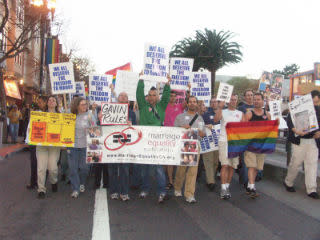Event preview: Marriage equality at the Supreme Court

David Boies and Ted Olson, two of the nation’s most prominent lawyers who famously challenged California’s ban on same-sex marriage, will join the National Constitution Center’s Jeffrey Rosen for a public event on Friday.
Boies and Olson, known previously for their high-profile showdown as opposing counsel in Bush v. Gore (2000), will discuss their joint battle against California’s Proposition 8, which legally defined marriage as between one man and one woman.
Boies, the chair of Boies, Schiller and Flexner, was named one of Time’s “100 Most Influential People in the World” and has received numerous accolades from his peers.
Olson, a partner at Gibson Dunn and a former U.S. solicitor general, boasts a 75 percent success rate at the Supreme Court.
The two lawyers recount their four-year journey to the nation’s high court in their new book, Redeeming the Dream: The Case for Marriage Equality.
In November 2008, California voters passed Proposition 8 with 52 percent approval. The California Supreme Court then upheld the proposition in May 2009 with its ruling in Strauss v. Horton.
That same year, two couples brought a fresh challenge—this time in federal court.
The case, known at the time as Perry v. Schwarzenegger, was heard in the U.S. District Court for the Northern District of California. The governor at the time, Arnold Schwarzenegger, and his attorney general, current governor Jerry Brown, elected not to defend the proposition in court. Instead, proponents appointed their own counsel.
In August 2010, Chief Judge Vaughn Walker ruled Proposition 8 unconstitutional under the Fourteenth Amendment.
That ruling was upheld by the U.S. Court of Appeals for the Ninth Circuit, but only after the California Supreme Court had determined that the plaintiffs had standing to bring the challenge in the first place.
On appeal at the U.S. Supreme Court as Hollingsworth v. Perry (2013), however, the question of standing—that is, one’s ability to demonstrate sufficient personal harm to merit one’s legal petition—proved to be the decisive consideration.
In a 5-4 ruling led by Chief Justice John Roberts, the high court determined that the clients of Boies and Olson did not, in fact, have standing, and that the ruling of the District Court was the decision that should be enforced.
Although the Supreme Court’s decision never actually addressed the constitutionality of Proposition 8, same-sex marriage in California was effectively legalized as a result.
The event will begin at 6:30 p.m. Tickets are required; advance purchase recommended. For tickets, please call 215.409.6700 or order online. All tickets include a copy of Redeeming the Dream.
Recent Stories On Constitution Daily
America’s forgotten war started on this day in 1812
Scalia’s religion remarks and the First Amendment
Constitution Check: Does being a child still make a constitutional difference?
Supreme Court decides on straw-purchasing and firearms sales

